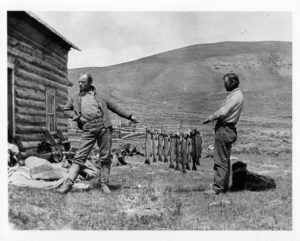Homesteading in the American West offered individuals ample opportunities to test their self-sufficiency against the unpredictability of nature. Fremont County offered its own people such an opportunity through fishing in the Wind, Popo Agie, and Sweetwater rivers as well as in other lakes, ponds, and streams. Fremont locals continue to fish in these areas, though for different purposes and within an entirely different set of circumstances.
In modern America, we often associate fishing with a unique blend of recreational patience and skill; the reward being the pride of the catch and a nourishing meal. During the frontier period, fishing wasn’t so much a fun choice as a true need. Survival necessitated frontiersmen acquire a versatile skill set that would grant them food to sustain themselves and their families (if they had them) consistently. As such, a day spent fishing without a catch was not only a disappointment to frontiersmen but a risk to sustaining the lives of themselves and those they cared for. Fishing (successfully) provided a method to keep people fed and energized enough to complete the manual labor required in daily frontier life.
The fishing technology available to early frontiersmen made a successful catch all the more difficult to achieve. Frontiersmen built their own tools when it came to acquiring sustenance. Homemade fishing gear from the frontier days commonly included a straight stick, fishing lines (made from horsehair or plant fibers), hooks (made from bone, wood, or metal scraps) and bait (worms or insects). These materials were less than perfect tools. Homemade fishing rods do not bend at the perfect angle when a cast is made nor is a high-quality reel, which assists in casting a line further and retrieving a line faster, part of the frontier story. The luxury of a tacklebox full of high-quality gear and a fishing pole with a fast line speed are far removed from the reality of the technology available at the time. With survival on the line, it’s hard to imagine homemade tools being enough to make a catch. Certainly, nets and spearfishing were also tactics used in this period, but both had their setbacks and neither provided the conveniences of today.
Fishing itself evolved in Fremont County due to environmental shifts and human intervention. Some of these changes could have proven helpful to frontiersmen in their quest for survival, had they been accessible. One such shift occurred in the 1930s, when fish cultivated in hatcheries were released into Ocean Lake. Fish stocking, as this process is called, can both manage the populations of various types of fish—helping the desired types of fish to increase while diminishing the less desirable types—as well as encourage local fishing practices. Frontiersmen could not count on such a practice and had to make do with the waters and fish available to them without this human intercession. If they returned home without a fish on the line, they did. If they caught “undesirable” fish, they did. Frontiersmen had far less ability to shift nature or to act within it. Reality loomed large over frontiersmen in Fremont County who hoped to live off of the land and build their lives well into the future.
With all of these historical forces working against them, it’s a wonder how the two men in the above photograph could have made such a large catch in Fremont County!
Author: Jami Cannon, Riverton Museum
Next up for the Fremont County Museum
April 19, 1-3pm at the Pioneer Museum, “Sheep Shearing Day” Bailey Tire/Pit Stop Children’s Exploration Series
April 26, 9-2 with the Pioneer Museum, “Garden Expo Craft Booth” Bailey Tire/Pit Stop Children’s Exploration Series
April 26, 10am at the Dubois Museum, “Wind River Kites: Make Your Own Kite” Bailey Tire/Pit Stop Children’s Exploration Series
May 1, 2pm at the Dubois Museum, “Shippen Family Legacy in Dubois” Wyoming Community Bank Discovery Speakers Series
May 17, 9am with the Dubois Museum, “Butch Cassidy at Jakey’s Fork” Wind River Visitors Council Adventure Trek Series
May 22, 7pm at the Pioneer Museum, “Lander 1925” Wyoming Community Bank Discovery Speakers Series
May 24, 1-3pm at the Pioneer Museum, “Being a Pioneer Kid” Bailey Tire/Pit Stop Children’s Exploration Series
May 24, 10am at the Pioneer Museum, “Lander Main Street Trek” Wind River Visitors Council Adventure Trek Series
May 31, 11am at the Riverton Museum, “Horned Owl Draper Raptor Experience” Bailey Tire/Pit Stop Children’s Exploration Series
Oct 4, TBA at the Lander Community Center, “Rare Relics Roadshow” Wind River Cultural Centers Foundation
Call the Dubois Museum 1-307-455-2284, the Pioneer Museum 1-307-332-3339 or the Riverton Museum 1-307-856-2665 for detail regarding their programs.
The Dubois Museum, the Pioneer Museum in Lander and the Riverton Museum need your financial support. In the current economic environment, the museums are more reliant than ever on donations from the private sector to continue to provide the quality programs, collections management, exhibits and services that have become their hallmark over the last four years. Please make your tax deductible contribution through the Wind River Cultural Centers Foundation www.windriverccf.com or by sending a check to Fremont County Museums 450 N 2nd Rm 320 or taking it directly to the museum you choose to support.


